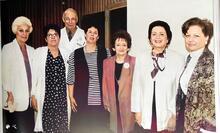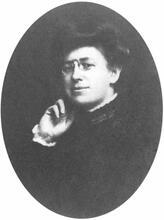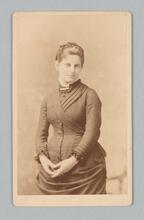Blanche Frank Ittleson
Blanche Frank Ittleson was a trailblazer in the treatment and teaching of intellectually disabled and emotionally disturbed children. Ittleson trained as a kindergarten teacher, but after giving birth to a mentally disabled son, she studied social work at Washington University’s School of Social Economics. After moving to New York, she created the Vocational Adjustment Bureau for Girls in 1919, which tested young women for mental problems and offered treatment and vocational training as well as employment. At a time when treatment was rare and usually involved institutionalization, this was revolutionary. In 1932 Ittleson and her husband founded the Ittleson Foundation, which focused on funding health, welfare, and public education for the intellectually disabled. In 1953 she also created the Henry Ittleson Center for Child Research, which continues to offer treatment and special education for autistic or emotionally disturbed children to this day.
Early Life and Family
Blanche Frank Ittleson was a philanthropist and a pioneer in social work intervention for intellectually disabled and mentally and emotionally disturbed children.
Ittleson was born September 27, 1875, into the third generation of a prominent German Jewish family in St. Louis. She was the oldest of four siblings, all brothers. After completing high school, she trained as a kindergarten teacher. In 1898, she married Henry J. Ittleson. They had two sons, Henry, Jr., and Lee, who was intellectually disabled. Moved by Lee’s needs, Ittleson continued her interest in child development and studied social work at Washington University’s School of Social Economics. The Ittleson family moved to New York City in 1915, where Henry Ittleson founded Credit and Investment Company, the first time-payment company in the United States. (It is now the CIT Financial Corporation, a broadly diversified financial company.)
Work and Contributions
To meet the needs of “maladjusted” women in the city, Ittleson organized the Vocational Adjustment Bureau for Girls in 1919. This introduced a new program in social work administration and rehabilitation. The bureau tested, treated, and trained emotionally disturbed and intellectually disabled girls. As well as obtaining employment for them, it provided a sheltered workshop where the young women could work while they were being treated and vocationally trained. The organization represented a new concept in specialized and integrated care for “maladjusted” girls. The bureau continued to run until 1950, when its functions were absorbed into other agencies.
In 1932, Ittleson and her husband used their wealth to found the Ittleson Family Foundation (now the Ittleson Foundation) as a general philanthropic organization. With the death of Henry Ittleson in 1948, Henry Ittleson, Jr., assumed control of CIT Financial Corporation, and Blanche Ittleson redirected the foundation to focus on the fields of health, welfare, and public education for mental health, with special emphasis on children. In 1953, she funded and organized the Henry Ittleson Center for Child Research in New York for the modern care of emotionally disturbed children. The center, which still operates, provides therapy and schooling for children with psychotic disorders or autism and for victims of abuse. Ittleson also endowed the Blanche F. Ittleson Chair of Child Psychiatry at the Washington University School of Medicine in 1955, the first endowed chair in child psychiatry in the United States.
Honors and Legacy
Later in life, Ittleson continued to be active in the fields of social work, mental health, and philanthropy. She was director and officer of the National Association for Mental Health, a board member for the Board of Jewish Guardians, an honorary president of the U.S. Committee for the World Federation of Mental Health, and a trustee for the Federation of Jewish Philanthropies. She was the recipient of many awards and honors. In 1962, for example, the Social Work Recruiting Committee for Greater New York established the Blanche F. Ittleson Award for outstanding community service. True to her legacy, the Ittleson Foundation remains active today in promoting intercultural relations, and in supporting and developing innovative programs that aid the mental, medical, and social well-being of disadvantaged women and children.
Blanche Frank Ittleson remained active and vital well into her nineties. She died on August 16, 1975, six weeks short of her hundredth birthday.
AJYB 77:595.
Ittleson, Anthony [head of Ittleson Foundation]. Interview with author, May 1996.
Ittleson, Blanche Frank. Archives. Ittleson Foundation, NYC.
Ittleson Family. Interviews with family members.
Obituary. NYTimes, August 17, 1975, 45:1.








